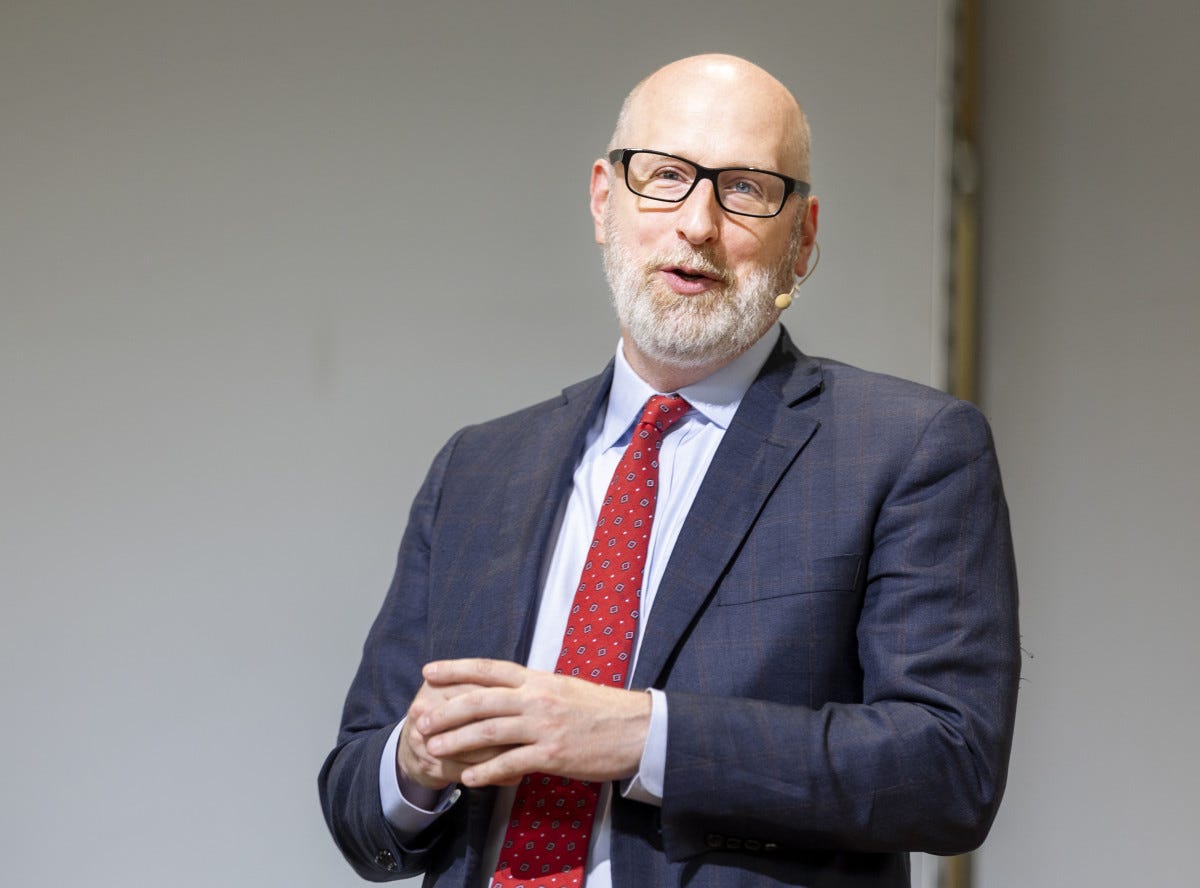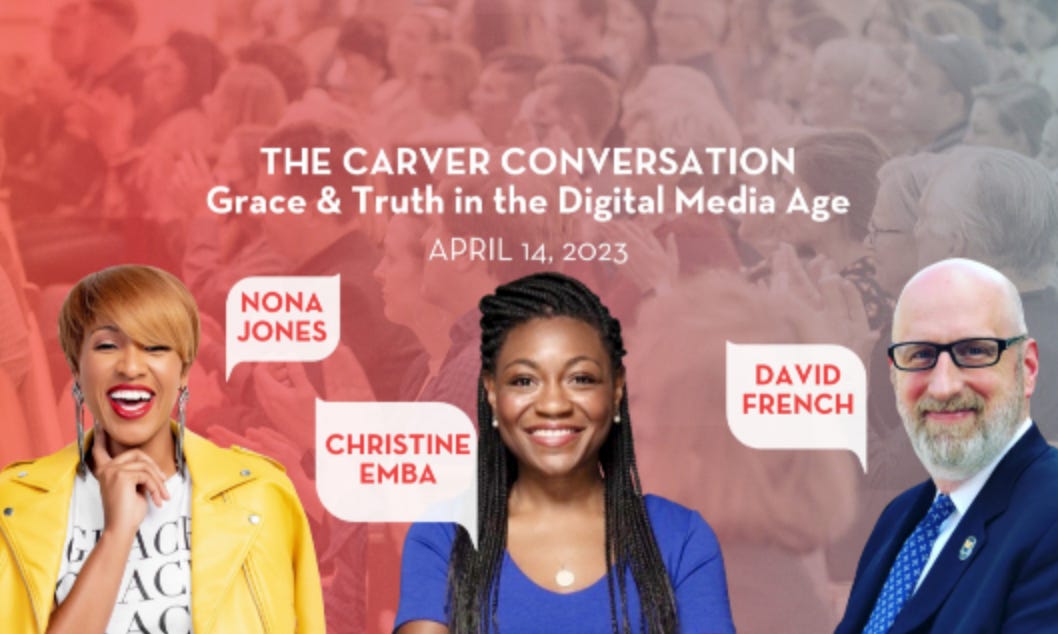David French on Pluralism and Temperament
My Q&A with the author, attorney, and political commentator
David French is an attorney and political commentator who serves as a senior editor of The Dispatch and a contributing writer for The Atlantic. Earlier this month, I wrote about David’s disagreement with Albert Mohler over the viability of pluralism.
David and I have known each other for a long time, and we often write about similar issues. I was delighted he was able to sit down with me for a Q&A.
John Inazu: In your 2020 book, Divided We Fall, you wrote that “at this moment in history, there is not a single important cultural, religious, political, or social force that is pulling Americans together more than it is pushing us apart.” Has anything changed in the past two years? If so, how? And if not, how long can we go?
David French: That’s a great question. I can think of one thing that might be pulling us together. And it’s not an awesome thing, but it’s something: exhaustion. The “exhausted majority” represents a latent mass of people who are tired of conflict, extremism, and unwillingness to compromise. That exhaustion could lead to retreat, like Homer Simpson disappearing into the bushes. But that exhaustion could also mean “we’re sick of it.” If you squint, you can see the 2020 and 2022 election results representing this exhaustion.
JI: Some people want to position themselves as “moderates,” but I’m wary of that description. As I wrote in an earlier post, “I hold strong views about many issues. Many of these are not ‘moderate’ views, and few of them represent a ‘centrist’ midpoint of partisan positions.” How do you think about this label?
DF: No one would describe my views of the First Amendment as “moderate.” I have deep convictions. But I am temperamentally moderate. I have found in our current age is that despite having strong convictions in one direction or the other, you can be “moderate” if your temperament is moderate.
JI: How does moderate temperament connect with strongly held views?
DF: Take the counsel in Micah 6:8 to act justly, love mercy, and walk humbly with God. Displaying the latter two virtues translates to temperamental moderation, even as you’re pursuing justice.
JI: And the corollary to this is that justice without mercy or humility also falls short of a faithful witness.
DF: Yes. A lot of people read the Bible and see these temperamental virtues, but they reinterpret them focusing solely through the lens of truth and justice: “I am loving you by speaking harshly to you.”
JI: You and I have spoken before about the number of hateful responses you receive to your writing. I sometimes get these too, but not at your level. How do you process these as a human being, and how do you think about forgiving hate when those sending it are unlikely to ever repent?
DF: When I figure this out, I’ll let you know. This is a work in progress. I usually think I’ve come to terms with the fact that this is how life is, but then I’ll see something online that really knocks me back. Or I’ll receive a viable threat. I put these into different categories. The threats require urgent responses. The hate requires a balancing. A lot of hateful expression is there for the purpose of catching my attention. They want me to react. Most of the time, it’s in my best interest to ignore it. Sometimes, I have to step in and call out distortions and mischaracterizations. But this balancing is more art than science. The real challenge is to guard myself against malice while still being open to legitimate criticism. There’s a temptation to put on such thick armor that you won’t listen to anyone. But sometimes the critiques come because you’re wrong.
JI: I’ve written in the past about the dangers of moving from thinking someone is wrong to thinking they are evil and the risk this shift poses for the future of our civic peace. What are your thoughts about that shift?
DF: I’ve written before that “animosity is the enemy of liberty.” It’s easy to convince somebody of the importance of something like free speech if they think their opponents are wrong but operating in good faith. It is much harder to convince somebody to grant the same rights to people they believe are evil. When you think about the Nazis, it’s right to call them “evil.” But what if you’re expanding the definition of evil so dramatically that it encompasses the vast majority or maybe all of your political opponents. When that happens, human nature will lead you to silence and suppress your political opponents, and you’re going to feel really good about doing it. That is a cultural threat to civil liberties that is rooted in animosity. Once you’ve determined that somebody is evil, the case for free speech advocated by John Stuart Mill becomes very hard to justify. If you think somebody is wrong, then you may have something to learn. If you think somebody is evil, the benefit of hearing their ideas is outweighed by the harm that somebody might actually believe them.
JI: Who are the contemporary writers who most influence you?
DF: On the Left, I am a faithful reader of Ezra Klein, especially more recently because of his work on the Left critiquing the Left. I’m really interested in internal critiques. I’m super familiar with Left critiques of Right and Right critiques of Left, but what I’m really interested in are internal critiques. I read everything from Elizabeth Bruenig, Caitlin Flanagan, and Adam Serwer. I disagree a ton with Michelle Goldberg, but she has a lot of important insights. On the Right, what’s sad is how much of the Right media has turned into “infotainment.” That’s not true of Ross Douthat, David Brooks, and Pete Wehner, among others, as well as colleagues at National Review. These are folks on the Left and Right who are honest, curious, and seeking understanding.
JI: You and I are both military veterans, and I’ve been thinking about the absence of veterans in our professions. Do you have any thoughts on this?
DF: Do I have thoughts? I have so many thoughts about this, along the lines that more elites need to join the military. The American population is pretty well represented in the military overall, but not at the elite levels of society. And when I say “elite,” I don’t mean upper middle class, I mean law professors and people who write for mainstream legacy publications. You and I are both in rooms all the time where we’re pretty sure we’re the only veteran there. A similar sized gathering in almost any other context in American society will have several veterans.
JI: The two of us are collaborating with Eboo Patel and some other friends on a new interfaith initiative. Why is interfaith engagement important?
DF: I think interfaith engagement is absolutely critical for maintaining our pluralistic republic. It helps remind us of one of the great miracles of our republic: the existence of religious peace. When you drive down Franklin Road in Nashville, Tennessee, and pass churches, synagogues, and other houses of worship, that’s a miracle. When people say, “Pluralism can’t survive conflicts over sexuality,” I say “What are you talking about? Pluralism has survived conflicts over the meaning of eternity.”
If you were challenged, provoked, or encouraged by my discussion with David, I recommend his subscribing to his newsletter and podcasts on The Dispatch. David and his colleagues describe The Dispatch as “a digital media company providing engaged citizens with fact-based reporting and commentary on politics, policy and culture—informed by conservative principles.”
One More Thing
David will join Nona Jones and Christine Emba in St. Louis on April 14, 2023, for the 2023 Carver Conversation: Grace & Truth in the Digital Media Age. The event is free and open to the public—look for registration details early next year.







John, thanks for the good interview with David. I think that the more social commentators like yourself and David can actively engage with each other and form a temperamentally moderate critical mass of public influence, the more justice and mercy and humility will prevail. I hope you can keep giving these interviews and relationships a strong public platform.
“temperamentally moderate”. That used to be a lot easier for me but I think since 2016 or so, the struggle has been real for me. But I want to be temperamentally moderate, though. It’s the right way to live.